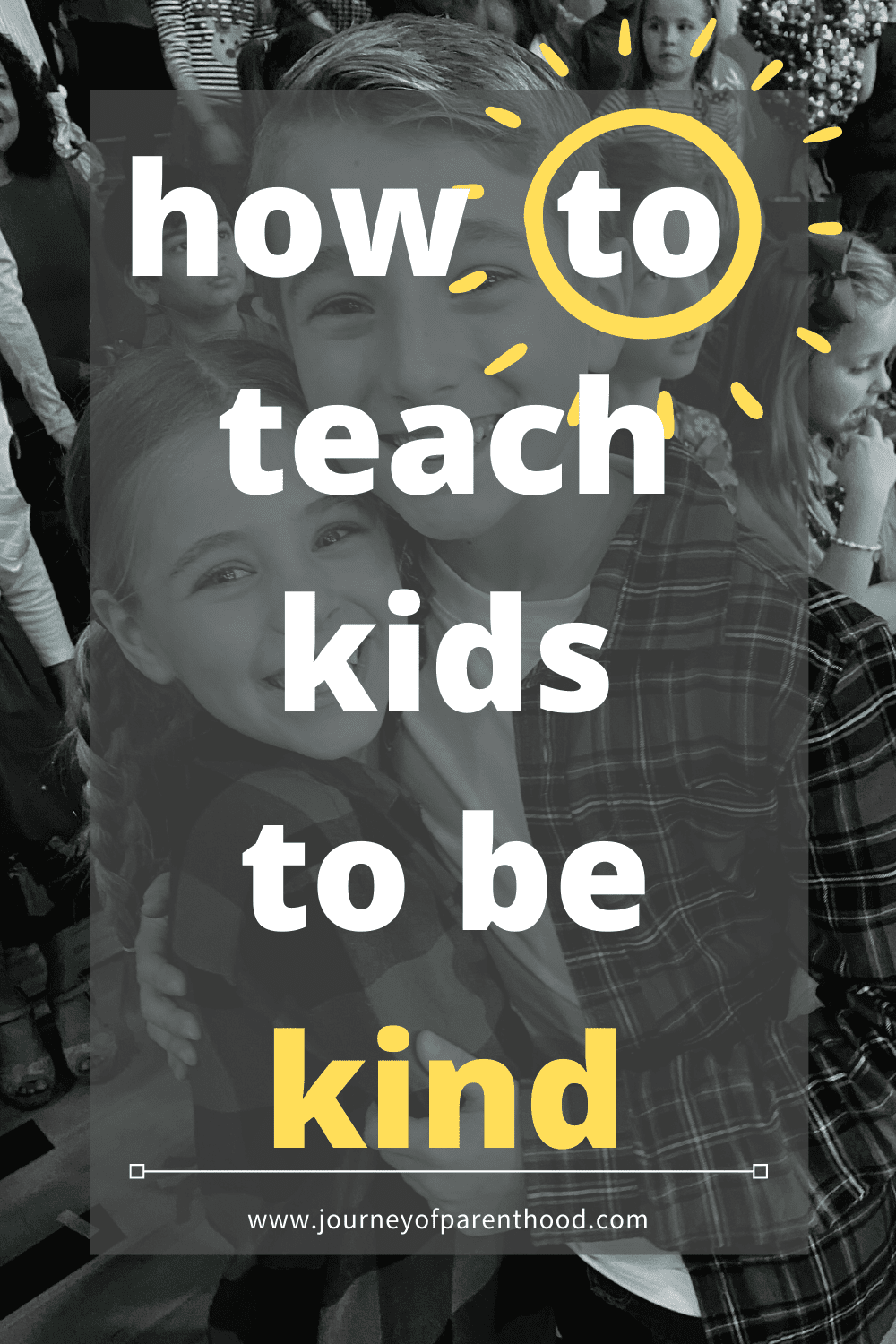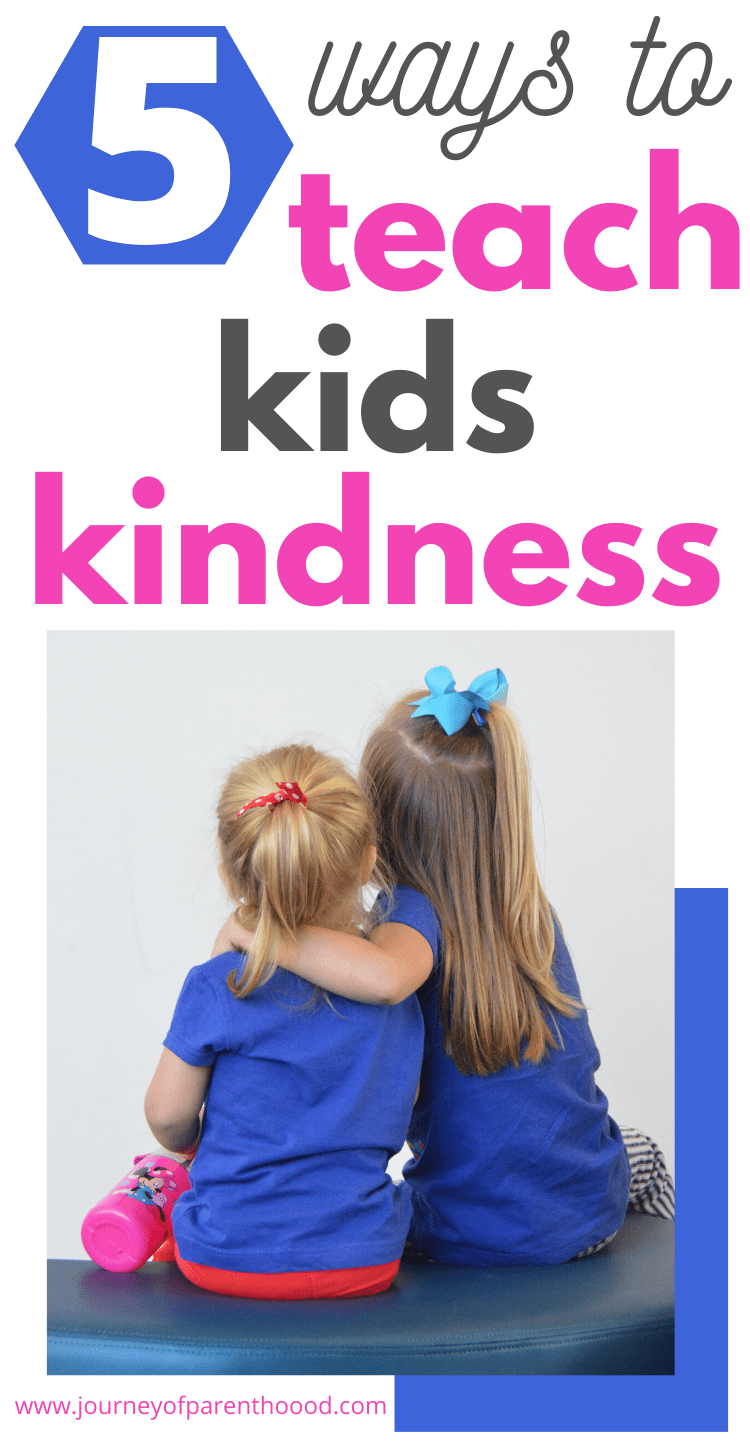Kindness is not something someone is born with. We are not naturally kind and caring people who want to help others or put their needs before our own.
Since the fall of man humans have been naturally sinful people. It takes work, effort, energy, and consistent focus to train ourselves to be kind.
It is our job as parents to teach kindness to our children. Children learn from us and model their behaviors after our own.
We want to raise our kids to be light in a dark world and to spread love, joy, and goodness to everyone they encounter!
We teach kids about kindness when they watch us caring for others and when we explain to them how to be kind as well as what we expect from them when it comes to putting others’ needs before their own.
We care about our family unit and the health of our society.
Parenting begins the moment a baby is born.
I not only want my children to be kind to the outside world…but to also be kind to each other within our family unit too.
That sibling bond is so special and valuable and I believe what we start at home is what will extend outward.
Today my #goalmom, Val, is sharing her wisdom on teaching children kindness:
How To Teach Your Child To Be Kind
by Valerie Plowman
One of my greatest goals for my children is for them to be kind to others.
I have taught my children that if they do their best to be kind to others, then if the day comes that someone says mean things about them, others won’t believe it.
I want them to be someone who brings light into the lives of others, not someone who sucks light from their lives.
Below are some ways to instill kindness and empathy in your child.

5 Ways to Teach Children Kindness
Explain Your Expectations
Studies show parents who have explained their expectations to their children about not drinking alcohol are less likely to have children who ever drink.
I figure this same finding can be transferred to other actions.
If you want your child to be kind to others, explain that you expect your child to be kind to others.
Talk about what your child should do if she sees someone lonely.
Explain that you do not want her saying mean things about others or laughing when others say mean things about others.
Let your child know that you expect kindness.
Be An Example of Kindness
Children always learn from the example of others, and surveys show parents are the number one influence on a child, even as teenagers.
Even teenagers report that their parents influence their behavior and decisions more than any other group — including friends.
If you want your child to be kind to others, you need to be kind toward others, both in your actions and in your words.
How do you talk about others? How do you serve others?
How do you treat others in your day to day life?
Your influence stands supreme in your child’s realm of influence.
Talk About Kind Acts Done and Kind Opportunities
Talk to your child each day (at a meal is a great time to do this) about the day.
Ask what kind acts your child observed that day.
What kind acts were done for your child?
What
What could your child do to show kindness toward others?
One day at dinner, my 8 year old talked about a new girl in class who was so naughty in class and wouldn’t listen to the teacher. She also was strange according to my daughter.
I happened to know that this new girl had a learning disability, and from helping in class and at a field trip, I knew that yes, indeed, she was obstinate, refused to do her work, and was very overbearing to someone she decided she liked.
Her social skills were not on par with her peers.
So yes, she was strange, and that was going to make it hard for her socially at school. She needed a friend.
I encouraged my daughter to see if this new girl wanted to play with her and her friends at recess.
We talked about how that would make this girl feel.
This particular child of mine is a “the more friends the merrier” type, so this was not a hard thing to convince her to do.
She immediately started inviting.
The other girl declined for days.
Then my daughter found a common interest — a certain book series.
See, the girl has a learning disability in one area but is still quite smart and is an avid reader.
The girl then would play with my daughter and her friends.
Some days, just my daughter would play with her.
Other days, the new girl wanted to play on her own, but she always had an invitation to play with friends if she wanted to do so.
This is just a small simple example of how encouraging a little kindness can go a long way.
Correct When Your Child is Not Kind
Whether your child is two and unkind toward another child at the playground, four and mean toward a sibling, or ten and laughing at a peer at school, be swift to correct that behavior.
Once again, make sure your expectations are understood by your child.
Explain what wasn’t kind.
Help your child understand the point of view of the other child.
Explain what your child could have done in stead of what was done.
Then take it further.
Teach your child how to apologize.
Require that your child apologize.
Learning to apologize is difficult. It is hard to be humble and admit you are wrong.
You will be giving your child such a gift to learn this skill.
I will also say, you have to decide that you care more about teaching and encouraging high morals than you do about high social status.
I see parents decide to say nothing to their child for fear their child will be less popular if he/she stands up for the picked on kid.
Put yourself in the shoes of the mother of the picked-on child.
What would your hope and prayer be?
How would your heart hurt for your child?
Would you hope the other mothers were teaching their children to be
A child who is kind will indeed always be well-liked.
I have faced that decision as a mom — popularity or kindness? — and I chose kindness.
It has not backfired.
It left my daughter feeling happier, more free, and thankful.
I got notes from her thanking me for talking to her and setting her straight.
She lost no friends over it and she was able to be her true, kind self.

Help Instill Empathy
Children can be quite selfish, so teaching empathy is a powerful way for your child to be able to be kind naturally without intervention.
When your child is upset about something, help her see the situation from the other perspective.
When she is unkind, help her understand why that was not kind.
When she comes home having had a fight with her friend at school, ask her about the friend.
Did the friend have a bad day? Did your child do something to upset the friend?
How would she feel if her friend did the same thing to her?
When your child talks about how mean or weird another child is, talk through reasons that child might be that way.
You might know the child has a hard home life that can help explain why the other child acts the way he acts.
Remind your child of times she was left out, yelled at, or laughed at.
Remind her of how she felt at the moment and how the other child might be feeling.
Conclusion
Kindness matters. Kindness makes a difference in the world.
You can do simple things to help teach your child that you expect kindness and demonstrates how to be kind.
Kindness is a trait learned and tested over time.
Make these five points a part of your every day lives and you will have a happy, kind child.
Valerie is the mother of four, ages 5, 8, 10, and 12 and blogs at www.BabyWiseMom.com
Personal Thoughts
I love this post from Val and always look to her for parental insight while raising my own children.
Empathy is a HUGE area I focus on with my kids when it comes to kindness.
I always swap perspectives.
It not only works great with teaching kindness but also parenting in other areas too.
For example, if my kids complain about the dinner I’ve cooked I will ask them how they would feel if they worked hard on a picture they colored for me and then I said “I don’t like this.”
Not only does changing perspectives help them think about being kinder with their words and actions but it also helps them appreciate the hard work Mommy does as a parent too!
Kindness is something we ALL have to constantly work on.
Even though we do our best to teach our children how to be kind, it is something that none of us will ever
We won’t ever find perfection, only Jesus knew that, but as we focus on letting our light shine towards each other we also are letting it shine for Him.
- A Letter to my Son on His 16th Birthday From Mom (Kye’s Bday Letter) - March 20, 2025
- Open Letter to my Daughter on her 12th Birthday – Love, Mom {Britt’s 12th Bday Letter} - January 16, 2025
- Letter to My Son on his 6th Birthday – Love Mom - January 8, 2025






